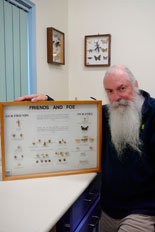Murray Fletcher
Principal Research Scientist
Orange Agricultural Institute
In the home garden, if there is damage to a plant caused by an insect, it's probably a pest. But you have to remember there are 'good' insects such as the recyclers (termites, cockroaches and ants), and useful predators, which can feed on pests.
 |
Murray Fletcher is Principal Research Scientist working on insect taxonomy for the Department of Primary Industries. His research concerns the identification and biodiversity of species. Murray is currently researching leafhoppers and planthoppers. |
| Image courtesy: Elisabeth Edwards | |
The harmful insects we find in gardens are related to what we grow in Orange, for example, the azalea lace bug, the ash whitefly, tomato russet mite, two-spotted mite, tomato stem borer, fruit flies, caterpillars, looper caterpillars, cabbage aphid, potato aphid and the Rutherglen bug.
You can get rid of aphids on roses by squashing them rather than spraying, but you may have to do it several times. Aphid predators such as the ladybird beetle larvae, hover fly larvae, spiders and birds do their work too. Predators will turn up if you have aphids unless you are spraying. They may not be quite as obvious as the aphids but they will be there doing their work. With insect sprays, always read what is written on the can because bees, for instance, can be killed by some sprays.
